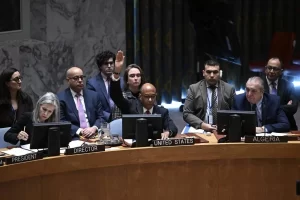U.S. Blocks U.N. Resolution Seeking Gaza Ceasefire

In a significant diplomatic move, the United States recently exercised its veto power at the United Nations Security Council to block a resolution calling for an immediate ceasefire in Gaza. The resolution, supported by the majority of council members, aimed to halt hostilities and facilitate humanitarian aid to the region, which has been engulfed in violence following renewed clashes. The U.S. decision has sparked international debate, highlighting the complexities of its foreign policy and its longstanding alliance with Israel.
The U.S. justified its veto by emphasizing the need to ensure Israel’s right to self-defense amid ongoing attacks from Hamas. U.S. Ambassador to the U.N., Linda Thomas-Greenfield, stated that while the U.S. supports humanitarian efforts, a ceasefire resolution at this juncture would not adequately address the root causes of the conflict or the security concerns of its allies. This stance underscores the U.S.’s commitment to Israel’s security, even as it faces criticism for not doing enough to alleviate the humanitarian crisis unfolding in Gaza.
The veto has drawn mixed reactions globally. While some nations condemned the move, arguing that it perpetuates violence and delays critical aid, others supported the U.S. position, acknowledging the complexity of achieving lasting peace in a region fraught with historical grievances. Humanitarian organizations, however, have expressed grave concerns over the escalating civilian toll, urging all parties to prioritize the safety and well-being of non-combatants.
This incident highlights the broader challenges faced by the international community in addressing protracted conflicts like the one in Gaza. The U.S. veto reflects a delicate balancing act—maintaining strategic alliances while grappling with mounting pressure to adopt a more humanitarian approach. As the situation evolves, the spotlight remains on diplomatic efforts to find a sustainable resolution that ensures security, justice, and peace for all parties involved.
Moving forward, the U.S. must navigate growing criticism and explore avenues for conflict resolution that address both immediate humanitarian needs and long-term peace prospects. The ongoing strife in Gaza serves as a stark reminder of the urgent need for collaborative global action to tackle the deep-seated issues fueling such conflicts.


